Health Insurance
85% of Parents Limit Kids’ Screen Time, but 23% Lie About How Much to Other Parents

Navigating screens and children is a relatively new dilemma parents face. As smartphones, tablets and more become increasingly integral to most Americans’ daily lives, many are keen to introduce their kids to screens in a healthy way.
In fact, 85% of parents with young kids monitor their kids’ screen time, according to the latest ValuePenguin survey of nearly 700 parents with kids under 18 — and 39% would like to restrict it further.
Here’s what else we found.
On this page
Key findings
- Parents with young children are limiting screen time, one way or another. The vast majority (85%) of parents with kids younger than 18 monitor their children’s screen time. Some methods include using parental controls (48%), physically controlling their devices (44%) and using apps to control screen time (31%). That may not be enough, though, as 39% say they’d like to further restrict screen time.
- For some parents, screen time is personal. 23% of parents admit to lying to other parents about how much screen time they give their children, while 20% lie to doctors about it. Men (29%) are more prone to lying to other parents than women (18%).
- But many pass judgment on other families' rules. 40% of parents admit to judging other families based on their screen time rules, while 45% say they have felt judged for theirs. Additionally, 30% have prohibited their children from spending time with friends who have different screen time limitations, even as a third (33%) say other parents influence the screen time rules in their homes.
- Screen time can be a point of stress for many families. 37% admit screen time has caused disagreements within their family or in their relationship, and 23% say their child has mental health issues they suspect are due to devices. Additionally, 43% say they have felt pressured to buy things based on their child’s interest in shows and videos.
- However, many parents appreciate the benefits that screens can provide. 92% of parents agree screen time can be beneficial. Noted benefits include educational purposes (67%), entertainment (61%) and giving parents a break (26%). When asked for the most common reason they give their child screen time, 33% said to entertain them or keep them quiet.
Parents prefer limiting screen time
Given the concerns surrounding screens, it may not be surprising that 85% of parents with kids younger than 18 monitor their children’s screen time. Specifically, 48% do so by using parental controls — the most common response. That’s followed by physically controlling their devices (44%) and using apps to control screen time (31%).
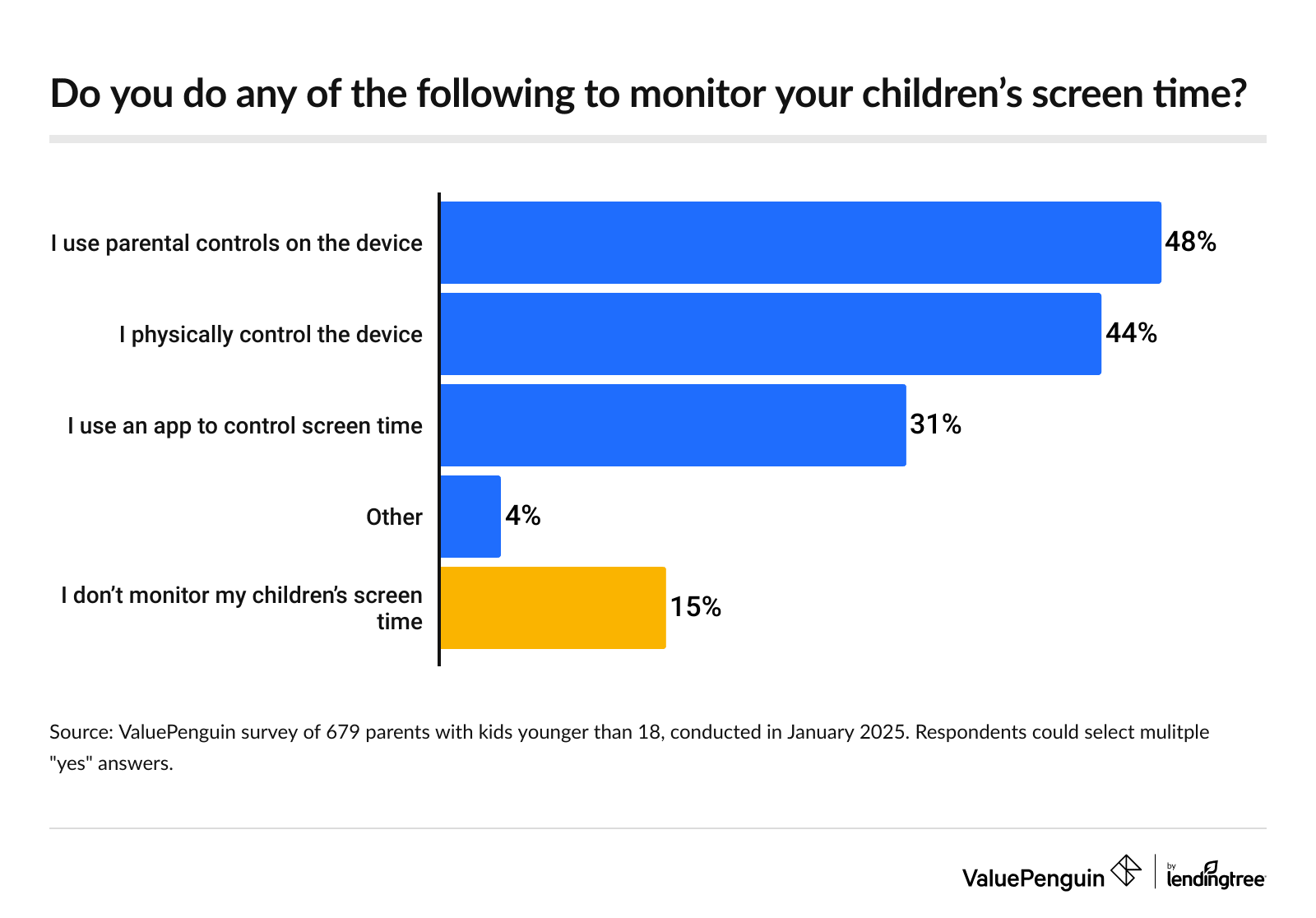
Gen X parents ages 45 to 60 (75%) are less likely to monitor their young children’s screen time than millennial parents ages 29 to 44 (87%). Additionally, lower-income parents are less likely to monitor their kids’ screens, at 77% among those earning $30,000 to $49,999. That compares with 90% of six-figure earners.
Still, many parents (39%) say they’d like to further restrict screen time, particularly six-figure earners (49%), men (45%) and millennials (43%). On the other hand, 42% of parents are satisfied with their current limitations and 4% would like to give their kids more screen time.
That said, ValuePenguin health insurance expert Divya Sangameshwar says screen time can have consequences. "Unlimited screen time for children can hurt the physical health, cognitive development and mental well-being of children," she says. "This includes obesity from a sedentary lifestyle, poor posture and musculoskeletal issues from hunching over a screen, eye strain and sleep deprivation."
Excessive screen time could also contribute to depression and anxiety (especially from social media), social isolation and behavioral problems, as well as difficulties with focusing and learning.
Those without kids have stricter opinions on screen time
Restricting kids' screen time is easier said than done. Although a similar 83% of nonparents think parents should limit their child’s screen time, those without children have slightly stricter beliefs.
Of the 789 nonparents we surveyed, 56% say the earliest appropriate age for a child to have screen time is 6 or older. Comparatively, 41% of parents agree, saying this was the age when they first allowed screen time.
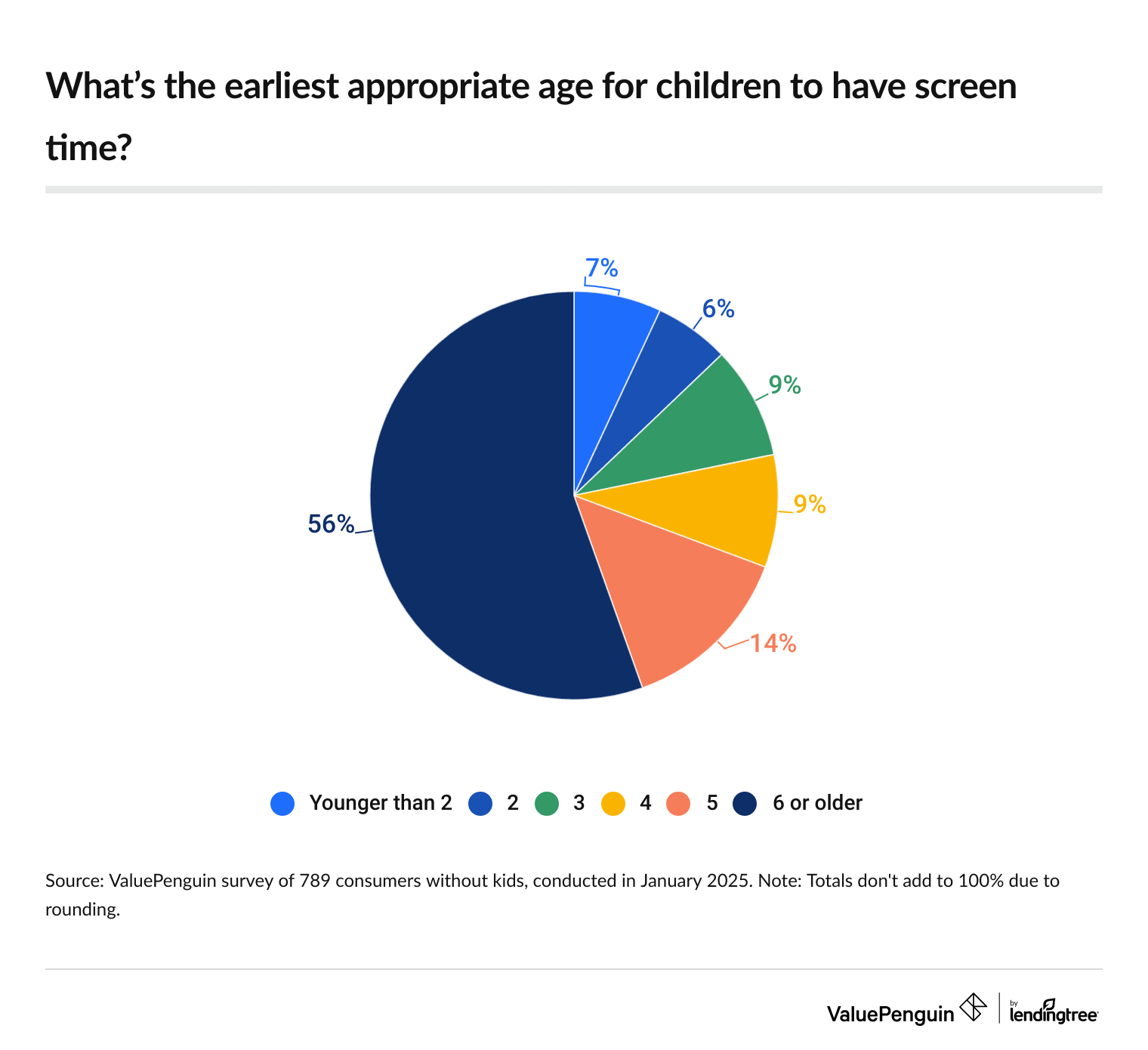
The rift is more apparent among those who are OK with younger kids having a screen. While 30% of nonparents say the earliest appropriate age for screen time is age 4, 3, 2 or younger, a whopping 50% of parents agree in practice.
Some parents lie about their kids’ screen times
Screen time is a point of pride for some parents. In fact, just under a quarter (23%) of parents admit to lying to other parents about how much screen time they give their children. Even higher rates can be seen among six-figure earners (32%), men (29%) and millennials (27%).
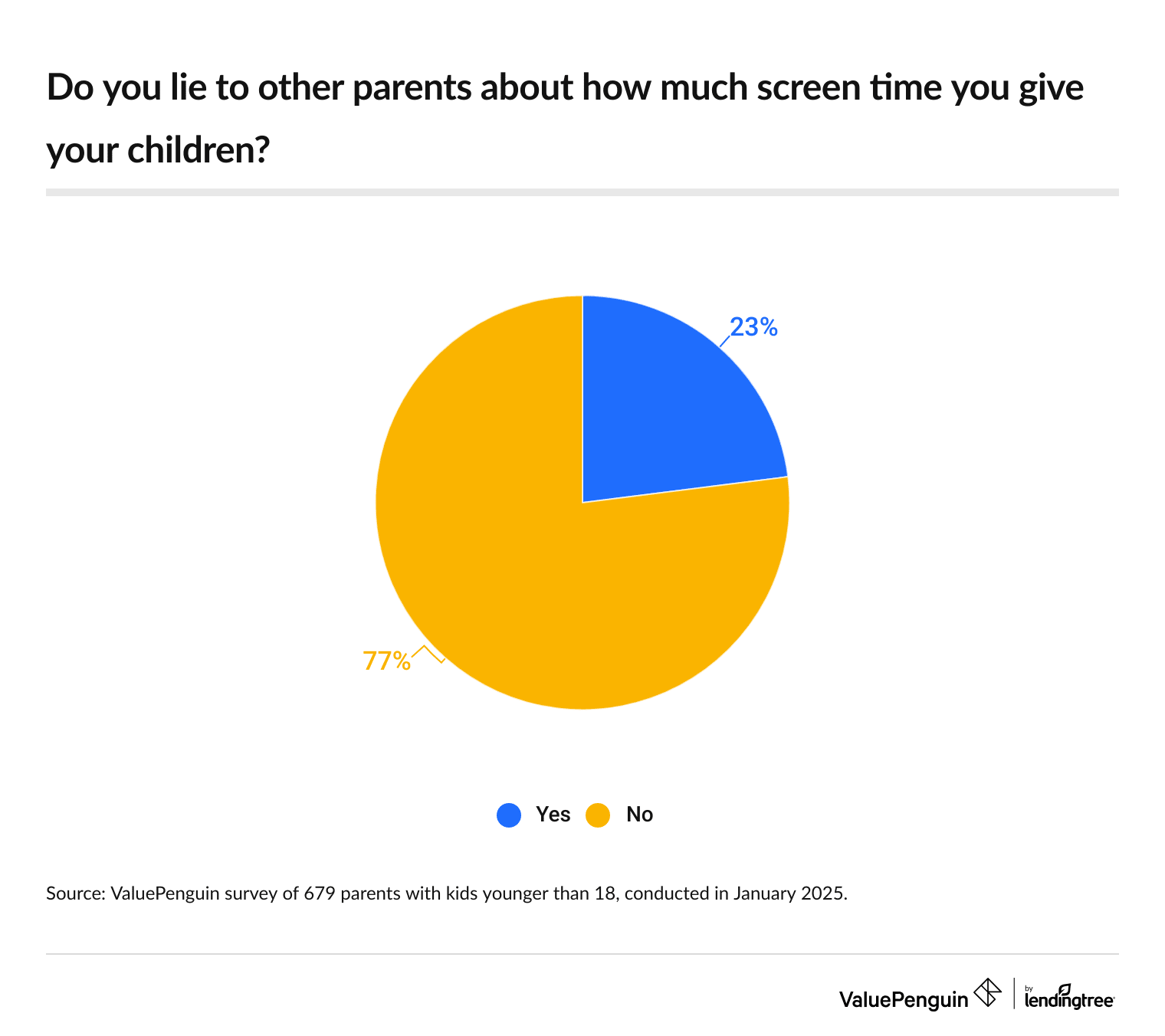
Meanwhile, 20% lie to doctors about their children’s screen time.
Sangameshwar believes many parents lie about their children’s screen time to mask their own guilt and fears.
"Parents who feel that they’re letting their child spend too much time on screens or using screens as ‘babysitters’ may lie to avoid the guilt they feel for potentially harming their child’s health and development," she says. "Parents who fear confronting their child’s out of control screen use (which often causes behavior problems) may not be monitoring their child’s screen use closely and may not know their child’s screen time. They often rely on estimates when speaking about this to other parents or to their health care providers."
Judging other families is easy for some
One reason why parents may lie? They’re critical of other parents’ screen time. In fact, 40% of parents admit to judging other families based on their screen time rules. Men (50%) are significantly more likely to be judgemental than women (30%).
At the same time, 45% of parents say they have felt judged for theirs.
Going a step further, 30% have prohibited their children from spending time with friends who have different screen time limitations, with six-figure earners (41%) and men (40%) particularly likely to do so.
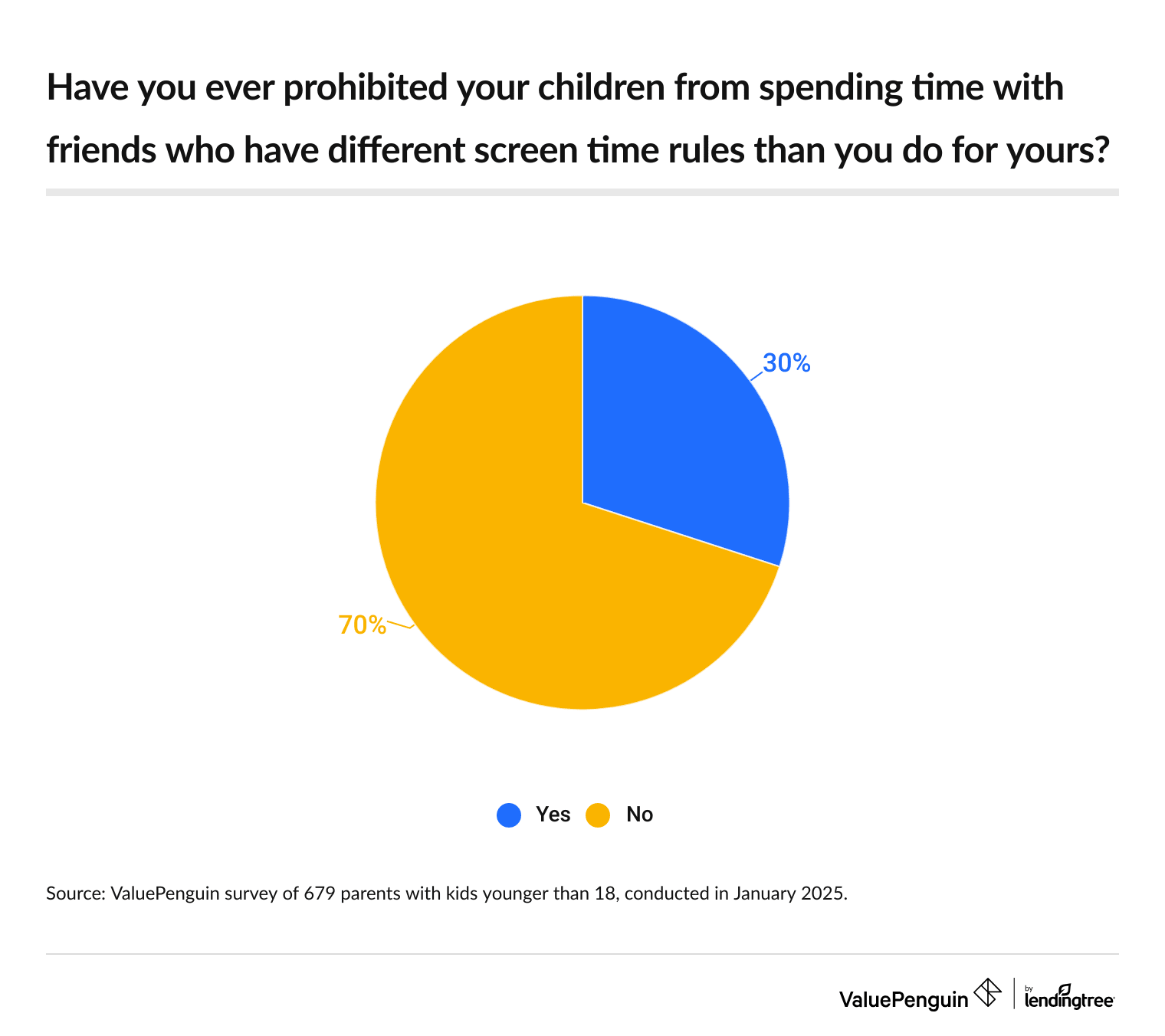
That said, 33% admit other parents influence the screen time rules in their homes, with 21% saying they give more screen time due to other parents’ influences and 12% saying other parents encourage them to limit screen time further.
Devices can cause family rifts
Like many things, screens can cause disagreements. Among parents, 37% admit screen time has caused disagreements within their family or in their relationship. Meanwhile, 23% say their child has mental health issues they suspect are due to devices.
Screen time can have financial consequences, too, as 43% say they have felt pressured to buy things based on their child’s interest in shows and videos.
Screens can be beneficial
Screens aren’t all bad, though. Overall, 92% of parents agree screen time can be beneficial. Specifically, 67% believe screens are useful for educational purposes. That’s followed by entertainment (61%) and giving parents a break (26%).
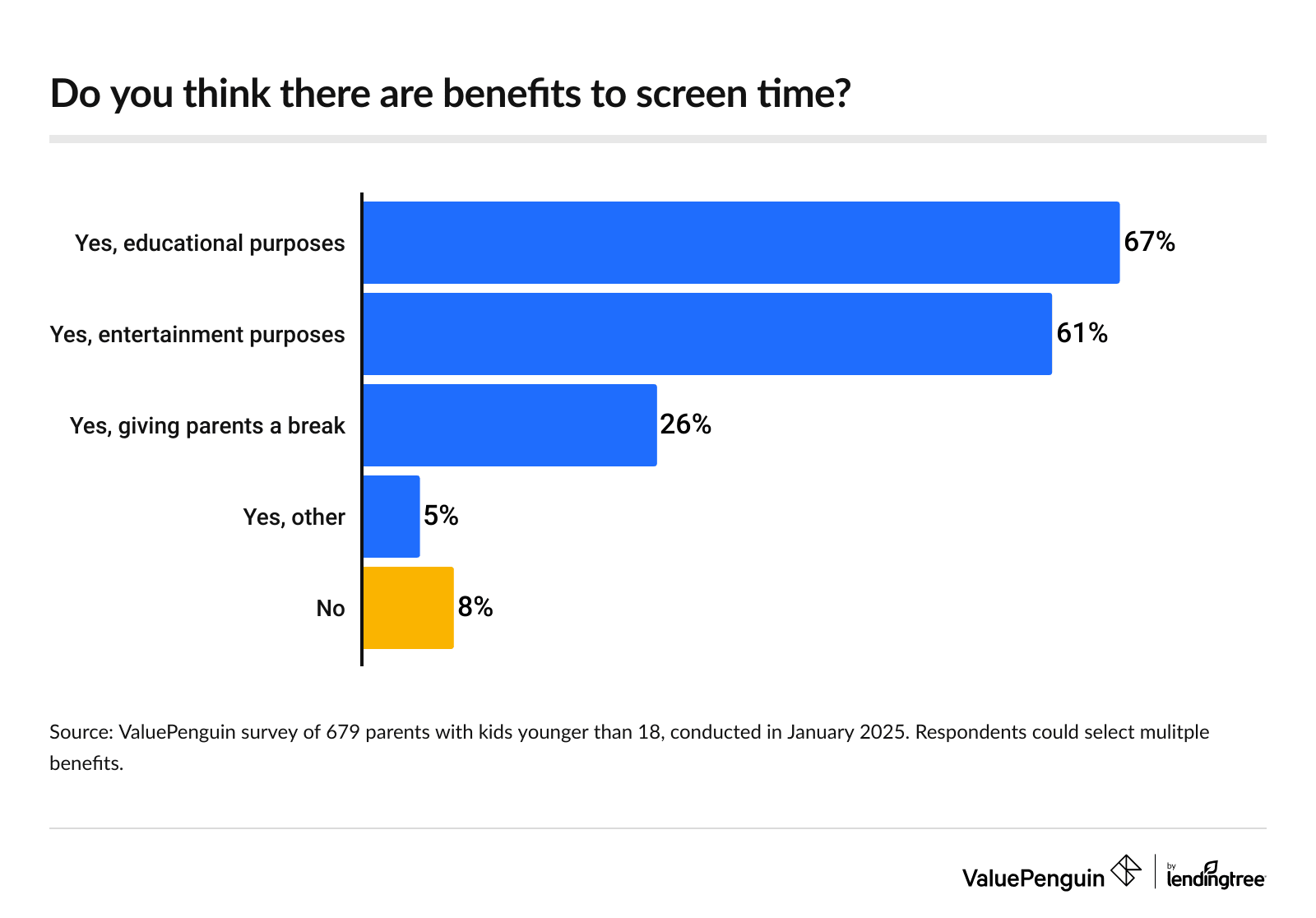
With that in mind, 74% say their child’s school frequently utilizes screens for teaching. While 27% say they wish it didn’t, 46% don’t mind that screens are in the school.
Screens can provide great breaks for parents, too, as 33% say their most common reason for giving their kids screens is to entertain them or keep them quiet. Beyond that, 32% give them screens to reward them and 27% believe they’re old enough to use screens on their own.
Navigating screens and mental health: Top expert tips
Technology is evolving rapidly, and we’re still learning the effects screens have on a developing brain, so it can be easy for parents to second-guess their rules surrounding screen time. For those trying to balance screens and their child’s mental health, Sangameshwar offers the following advice:
- Take a more active role in managing your child’s screen time. "This includes setting clear time limits, creating tech-free zones, encouraging active play, having open conversations about online behavior, monitoring the content children consume, using parental controls and prioritizing face-to-face interactions," she says. "In short, parents should focus on ensuring children aren’t relying solely on screens for entertainment and social connection."
- Help is available to parents whose children already have issues from too much screen time use. "While the situation can feel isolating and stressful, parents shouldn’t hesitate to seek treatment early," Sangameshwar says. "Insurers will cover the treatment and management for the physical symptoms of excessive screen use."
- Remember that ACA-compliant health insurance plans also cover mental health treatment. "That includes therapy, medications and more," she says. "Parents who are uninsured can also find help from low-cost or free clinics and their state’s mental health and substance use agency or their community health center for access to low-cost mental health care and therapy or counseling services. Like all other health conditions, early identification and treatment is key."
Methodology
ValuePenguin commissioned QuestionPro to conduct an online survey of 2,049 U.S. consumers — including 679 parents with kids younger than 18 and 789 adults with no kids — ages 18 to 79 from Jan. 16 to 21, 2025. The survey was administered using a nonprobability-based sample, and quotas were used to ensure the sample base represented the overall population. Researchers reviewed all responses for quality control.
We defined generations as the following ages in 2025:
- Generation Z: 18 to 28
- Millennial: 29 to 44
- Generation X: 45 to 60
- Baby boomer: 61 to 79
